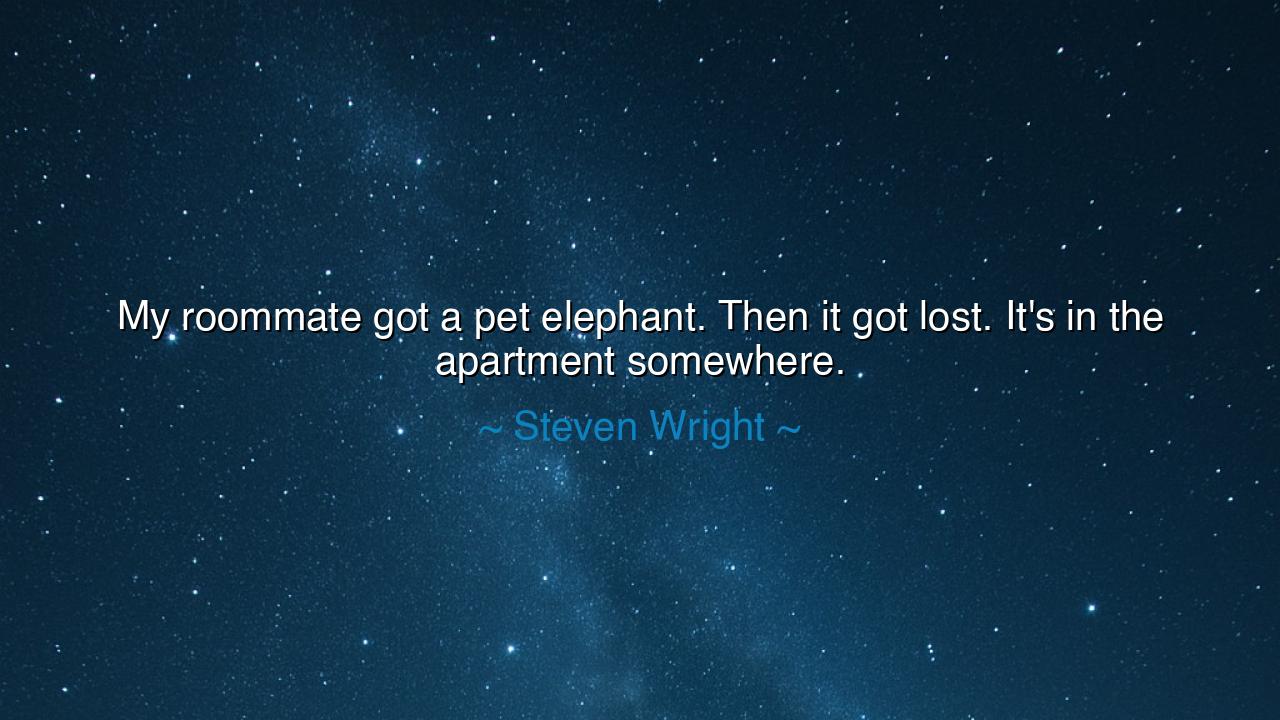
My roommate got a pet elephant. Then it got lost. It's in the






The comedian Steven Wright, master of paradox and subtle absurdity, once said: “My roommate got a pet elephant. Then it got lost. It's in the apartment somewhere.” At first, these words appear as nothing more than playful nonsense, a jest meant to spark laughter. Yet like many riddles wrapped in humor, they carry hidden meaning. For the elephant, vast and unmistakable, cannot simply be lost—and herein lies the wisdom. Wright’s words remind us of the human tendency to ignore what is immense, obvious, and unavoidable, pretending it has vanished when it is in fact looming before us.
The image of a pet elephant concealed in an apartment is a metaphor for denial, for the willful blindness of human beings to truths they do not wish to confront. We laugh at the impossibility of missing such a beast, yet how often do we fail to notice the "elephants" in our own lives? Great problems—broken relationships, unjust systems, unspoken sorrows—sit in the very rooms of our existence, yet we claim they are “lost,” hidden, nowhere to be found. Wright, with jest, points us to an ancient truth: that what we deny does not vanish.
History offers us a striking example in the fall of Rome. The empire, vast and powerful, was filled with cracks—corruption, overextension, internal strife. These problems were the elephant in the imperial apartment, too large to ignore. And yet leaders pretended otherwise, busying themselves with games, politics, and distractions. By the time they admitted the beast was present, it was too late; the walls had crumbled, and the empire fell. The elephant was never lost. It had been waiting all along, unseen only by those who refused to look.
The origin of Wright’s wisdom lies in the old saying, “the elephant in the room.” This phrase has long been used to describe an obvious truth that everyone avoids discussing. By turning it into absurd comedy—placing the elephant not merely in the room, but “lost” within the apartment—he magnifies the folly of denial. His humor is a mirror, and in it we see ourselves pretending not to see what towers before our eyes.
The lesson is powerful: confront the elephants in your life. Do not claim they are lost, do not pretend they are hidden. Acknowledge them. Whether it be fear, grief, injustice, or guilt, these mighty presences grow heavier the longer they are ignored. Only by naming them, only by facing them, can we begin the work of peace and resolution. To laugh at the elephant is good; to deny it is ruin.
Practical actions must follow. Ask yourself: what elephant dwells in my apartment, in my family, in my community? Is it a truth long avoided? A conversation left unsaid? An injustice tolerated in silence? Bring it into the light. Speak of it. Take steps, however small, to address it. For though an elephant cannot be hidden in truth, it can be guided out once it is acknowledged. Courage, honesty, and humility are the tools by which the great beast is led from the shadows.
Thus the teaching of Steven Wright endures: “It’s in the apartment somewhere.” Let not your life be a house of denial, where elephants wander unseen. Instead, make your dwelling a place of truth, where even the largest burdens are faced openly. And as future generations laugh at his wit, let them also learn from it—that humor may conceal wisdom, and that in laughter we often find the courage to face what we most fear.






AAdministratorAdministrator
Welcome, honored guests. Please leave a comment, we will respond soon